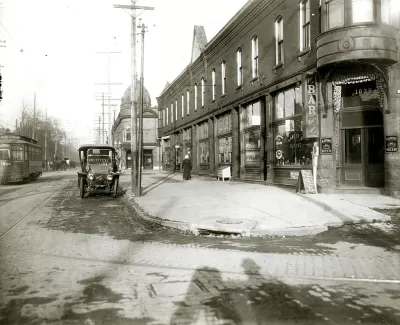More than a century of discriminatory housing policy divided cities and contributed to the racial wealth gap and other social and economic inequities.

Attorney George Fatheree III has written an excellent article on the history of racial zoning for Urban Land magazine. It begins in 1910, when Baltimore passed the first racial zoning ordinance in the U.S., making it illegal for Black Americans to live in white neighborhoods (and vice versa), which prompted other cities across the country to follow suit. From there the article covers how patterns of segregation formed and evolved under racially restrictive covenants and municipal zoning — and the related court case rulings — throughout the decades.
The “devastating effects … on those who have been kept out of historically white communities,” including higher poverty rates, lower home values and incomes, and lower home ownership rates, persist to this day, Fatheree writes, citing research from the Other & Belonging Institute. Featheree closes his article by discussing steps that need to be taken to reverse the effects of this discrimination and the role federal, state, and local governments should play in righting the wrongs they caused.
FULL STORY: A Brief History of Racial Zoning and How to Reverse the Lasting Effects of Housing Discrimination

Planetizen Federal Action Tracker
A weekly monitor of how Trump’s orders and actions are impacting planners and planning in America.

Chicago’s Ghost Rails
Just beneath the surface of the modern city lie the remnants of its expansive early 20th-century streetcar system.

San Antonio and Austin are Fusing Into one Massive Megaregion
The region spanning the two central Texas cities is growing fast, posing challenges for local infrastructure and water supplies.

Since Zion's Shuttles Went Electric “The Smog is Gone”
Visitors to Zion National Park can enjoy the canyon via the nation’s first fully electric park shuttle system.

Trump Distributing DOT Safety Funds at 1/10 Rate of Biden
Funds for Safe Streets and other transportation safety and equity programs are being held up by administrative reviews and conflicts with the Trump administration’s priorities.

German Cities Subsidize Taxis for Women Amid Wave of Violence
Free or low-cost taxi rides can help women navigate cities more safely, but critics say the programs don't address the root causes of violence against women.
Urban Design for Planners 1: Software Tools
This six-course series explores essential urban design concepts using open source software and equips planners with the tools they need to participate fully in the urban design process.
Planning for Universal Design
Learn the tools for implementing Universal Design in planning regulations.
planning NEXT
Appalachian Highlands Housing Partners
Mpact (founded as Rail~Volution)
City of Camden Redevelopment Agency
City of Astoria
City of Portland
City of Laramie





























